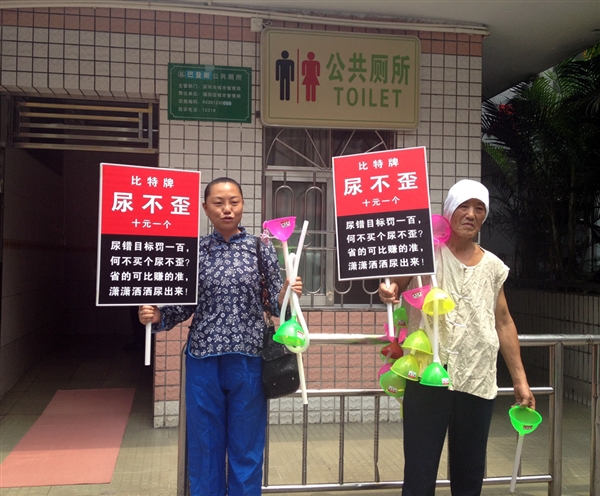Pee straight
« previous post | next post »
From Gloria Bien:
This comes from an NBC News Behind the Wall article entitled "Having trouble with your aim? Chinese contraption helps you 'Pee Straight'". The video it links to is overly long, but runs better when accessed separately here — the little ditty comes out much clearer.
About half the way through a guy demonstrates how to use the "Pee Straight", but he's not very good at it.
What's interesting for Language Log readers is the grammatical construction on which the name of the device is based, viz., resultative complement:
niào bù wāi 尿不歪
(lit., "urinate not crooked", i.e., "pee [with the result that you pee] straight")
Since the translation of the rest of the sign provided by NBC News does not convey the sentiment of the original very well, I provide this one for the benefit of Language Log readers who do not know Chinese:
When you pee, if you miss the mark they'll fine you a hundred,
Why not buy a "Pee Straight" instead?
You'll definitely save more than we earn,
And pee smartly to boot!
Translation notes:
The third line is a killer to get right: shěng de kěbǐ zhuàn de zhǔn 省的可比赚的准. Many of my Chinese friends and students say they can't make sense of it.
In the last line, note that the adverbial phrase xiāoxiāo sǎsǎ 潇潇洒洒 ("chicly; smartly; freely; unrestrainedly; elegantly and unconventionally") is interesting in that all four characters of which it is constituted have water radicals.
Another in our long series of urination posts (here's one of the recent ones, with references to earlier installments).
By the way, this is not a real "invention" but for show to satirize the new regulation concerning public restrooms in Shenzhen. Here is a link to a news item about it.

Denny said,
September 6, 2013 @ 12:16 am
The phrase 省的可比赚的准 is indeed very tricky to translate. I asked a couple of Chinese friends and they weren't sure either — might it be a non-standard usage (perhaps influenced by the local fangyan)?
The structure is clear enough, "A is certainly more 准 than B".
As an adjective, 准 can mean (according to Baidu Dictionary): accurate; exact; reliable; dependable. If we take it to mean "reliable" or "dependable", we could translate as follows:
省的可比赚的准
(that) saved-certainly-compared with-(that) earned-(more) dependable
"Money saved is more dependable than money earned"
That is, saving money is a guaranteed way to make money — even more dependable than earning money.
In more colloquial English, it might be loosely rendered as "A penny saved is a penny earned."
However, I'm not familiar with 准 on its own meaning "dependable", so perhaps I'm on the wrong tracks here. I also just had a thought — might there be some wordplay with peeing "accurately" and 准 (which primarily means "accurate")? That might be taking it a bit too far…
richardelguru said,
September 6, 2013 @ 6:08 am
Reminds me of the (apocryphal??) sign in an English Pub Loo:
We aim to please.
You aim too, please.
Ginger Yellow said,
September 6, 2013 @ 6:41 am
In more colloquial English, it might be loosely rendered as "A penny saved is a penny earned.
Given that "spend a penny" is a British euphemism for "pee", you could probably concoct a witty idiomatic translation out of that.
Ralph Hickok said,
September 6, 2013 @ 7:13 am
@richardelguru:
I saw such a sign in the men's rooms of several restaurants when I was a boy in Northeastern Wisconsin, late 1940s and early 1950s.
Gloria said,
September 6, 2013 @ 10:29 am
I didn't think this was ready to "go public," but Victor encouraged me to post:
I think the third line can mean, "you never know how much you'll earn, but you do know how much you'll save" (that is, 赚 can refer to the buyer rather than the seller). 准 is 对仗for 歪
I wish someone could come up with a rhymed rhythmic translation, but meanwhile, here are a couple of tries
Pee and miss it's a one-hundred yuan fine;
Why not buy a "pee-in-line?"
What you save is surer than what you'll earn;
Relax and pee, no need to learn!
It's a one-hundred yuan fine if you pee and miss;
Why not buy a "Can't-pee-awry?"
What you save you really can't buy,
So relax and free your piss.
I don't know how to fix the ine spacing…
mfong said,
September 6, 2013 @ 11:33 am
I 'm not a professional translator but I think, "saved is more accurate compared to earned" might work for context of 'penalty avoidance'… "[what is] saved is more accurate [pun intended] compared to [what is] earned".
Reinhold {Rey} Aman said,
September 6, 2013 @ 1:36 pm
@ richardelguru:
Reminds me of the (apocryphal??) sign in an English Pub Loo:
We aim to please.
You aim too, please.
I've seen such signs above various American urinals.
In some French hole-in-the-ground toilets, one can see this request:
Chie dur, chie mou,
mais chie dans le trou !
hanmeng said,
September 6, 2013 @ 1:58 pm
洒: to sprinkle / to spray / to spill / to shed
also "洒尿"
Eric P Smith said,
September 6, 2013 @ 5:25 pm
@richardelguru; I've also seen:
Our aim is to keep this toilet clean.
Yours can help us.